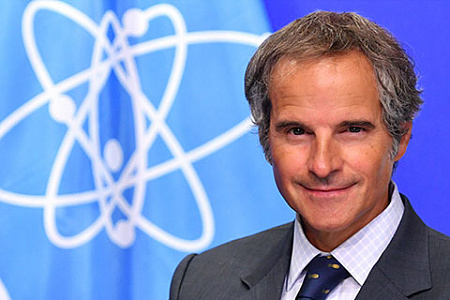
The June session of the Board of Governors of the International Atomic Energy Agency (IAEA) opened in Vienna on June 9. One of the main issues on the agenda was Iran’s nuclear program, which, according to calculations by international inspectors, has expanded in recent years. This can create the foundation for the manufacture of weapons of mass destruction in the country. Western countries have proposed to adopt a resolution at the IAEA session condemning Iranian activity. In response, Tehran promised to review relations with the agency.
The director of the organization, Rafael Grossi, said on the opening day of the session of the IAEA Board of Governors that “unresolved issues” remain around the Iranian nuclear program.
“Iran must urgently provide technically reliable answers to clarify undeclared nuclear materials and activities,” he said. “The agency found artificial uranium particles in each of the three undeclared locations in Iran.”
Since then, he said, the organization has been seeking explanations from Tehran. “Unfortunately, Iran has repeatedly either failed to respond or failed to provide technically reliable answers to questions. He also tried to sanitize the sites, which made it difficult to check,” Grossi added.
The facts that Iran has been conducting undeclared activities within the framework of the national nuclear program for many years are contained in the recent quarterly report of the IAEA. It stated that as of May 17, Iran possessed approximately 400 kg of uranium enriched to 60% (close to the weapons grade of 90%), which is 133 kg more than in the previous report in February. Separately, international inspectors have documented that Iran, by all appearances, conducted experimental explosions deep underground. Grossi stressed that at least three facilities are “part of an undeclared structured nuclear program” and that undeclared nuclear materials were used in this activity.
The United States and the Eurotroika (France, Britain and Germany) proposed to adopt a resolution at the June session of the IAEA that would condemn Iran for non-compliance with its nuclear obligations. The document, if adopted, could increase diplomatic pressure on Tehran just a few months before the expiration of key provisions of the Joint Comprehensive Plan of Action (JCPOA), the original 2015 nuclear deal. However, it is not entirely clear how this may affect the nuclear negotiations that the United States and Iran continue to conduct.
So far, Tehran and Washington have not decided when the next round of meetings on the nuclear issue should take place. “If a decision is made, it will be announced later,” Iranian Foreign Ministry spokesman Esmail Bagai said on June 9. “Any plan that does not take into account the interests and rights of the Iranian people, both in the field of peaceful nuclear energy, including uranium enrichment, and in lifting illegal sanctions, is unacceptable.” The diplomat added: “We will transfer our own initiative through Oman to the opposite side immediately after its final completion. Of course, it is in the interests of the United States to seriously consider this proposal.” It is known that the American proposal had not previously satisfied Tehran.
As Grossi explained, the draft resolution should be considered as part of the agency’s usual oversight responsibilities, and not as a political tool tied in time to the negotiation process between the United States and Iran.
However, Tehran interprets the IAEA’s efforts in its own way. He calls such reports a political weapon and threatens consequences. “Last time (when the agency’s Board of Governors adopted a resolution condemning Iranian nuclear activity. – NG) we warned, but they did not listen to us, and we increased the production of uranium enriched to 60% seven times,” recalled Behrouz Kamalvandi, representative of the Atomic Energy Organization of Iran. – Now we also have a list of retaliatory steps, and we have already notified them (the members of the IAEA. – “NG”) about it. Obviously, the agency should not expect Iran to continue constructive cooperation as before.”
Iran itself claims these days that it has received a batch of secret documents related to the nuclear program of its regional adversary, Israel. The Minister of Intelligence of the Islamic Republic, Esmail Khatib, called the archive a “treasure trove” that can strengthen the country’s offensive capabilities. According to him, the documents contain classified information about Israel’s defensive capabilities, as well as about the Jewish state’s relations with other countries. “The transfer of this treasure took a long time and required special security measures. Of course, the transfer methods will remain secret, but the documents themselves should be made public soon,” Khatib said.
However, international inspectors emphasize that a confrontational scenario will not solve anything. “I am convinced that the only way forward is a diplomatic solution backed by the IAEA verification mechanism,” Grossi said during the opening session of the Board of Governors. “I will continue to support and urge the United States and Iran to spare no effort, show wisdom and political courage to bring the matter to a successful conclusion.” He expressed confidence that “the stabilization of the situation in Iran in terms of the nuclear program” will have a rapid effect and will make the Middle East “one big step closer to peace and prosperity.”
